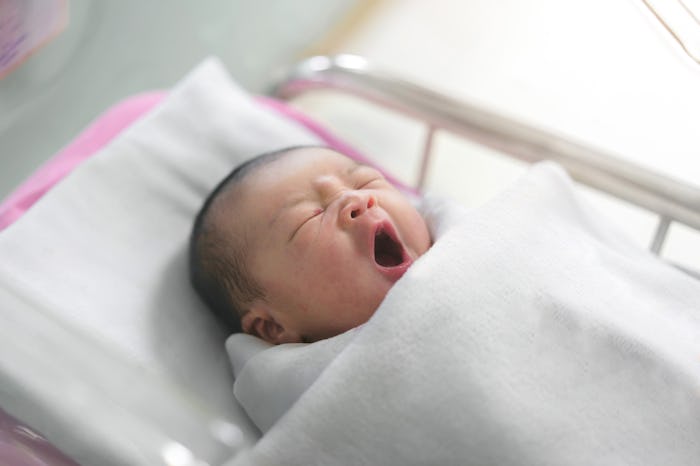Newborns

Here’s What Your Hospital Will Provide For Your Newborn
And what you need to make sure and bring.
Every expectant parent has heard of the importance of having a “go bag” — the bag you pack with all the essentials for your hospital stay that will, you hope, save you from having to run around the house looking for your toothbrush while mid-contraction. Figuring out what to pack for yourself is one thing. But what does your baby need? What will the hospital provide for your newborn, and what should you plan on bringing yourself?
What Will Your Hospital Provide For Your Baby?
There are three things your hospital is definitely going to have: diapers, wipes, and blankets — specifically, this blanket. (The ubiquitous white linen blanket with pink and blue stripes is the most common in hospitals; it’s been around since the 1950s and has been millions of newborns’ first outfit.)
While being caught without enough diapers or wipes after a blowout is a common fear for new parents, it’s not something that will happen during your hospital stay — diapers are so freely available that many veteran parents encourage you to take a bunch when you leave. (And if you find yourself running low in the room, just ask your nurse for more.) Guidelines published by the American Academy of Pediatrics for perinatal care mandates that a hospital provide a wheeled bassinet for your baby to sleep in — so, thankfully, there’s no need for you to haul in a Pack n’ Play with you.
If I Need to Pump, Will My Hospital Have One Available?
Hospitals will have a breast pump for you to use, but if you’re planning on breastfeeding and are organized enough to have gotten a breast pump for yourself before your baby arrived, bringing it with you is a great idea. Many insurance plans will cover a breast pump for expectant parents before their baby has arrived. Hospital staff, who often may include a lactation consultant, can be very helpful in helping you figure out the ins-and-outs of pumping, and, since every breast pump is a little different, actually getting practice with the one you’re planning to use while there are trained professionals around to help is a smart idea.
What About Formula & Pacifiers?
Other common staples of baby care, like formula and pacifiers, are something that your hospital will have, but may be less freely available if you deliver in a “baby friendly” hospital. “Baby friendly” hospitals are certified as such by an independent accrediting organization (Baby Friendly USA). In order to receive the accreditation, hospitals must demonstrate that their staff discourage the use of formula feeding or the use of pacifiers since, the theory goes, those can interfere with breastfeeding. While it used to be common for new parents to receive samples of formula when they head home from the hospital, that’s no longer common practice in any hospital, even if the hospital where you deliver isn’t officially designated as a “baby friendly” one.
If you’re planning to formula-feed, figuring out whether you’ll have easy access to formula for your hospital stay is a question that’s worth directly asking your hospital. Baby Friendly USA states that its facilities always have formula available, and that parents are not required to sign a waiver to access formula, yet women who have delivered at Baby Friendly hospitals have posted the waiver forms they were required to sign to access formula and talk about sometimes being outright denied access. A New York City website states that it is a a “myth” that formula is kept under lock-and-key in NYC hospitals; I gave birth in 2017, in an NYC hospital where the formula was very much locked up, and my access to it depended on which nurse was on duty.
In short, hospitals have formula, but you may have to advocate for yourself, and possibly sign a waiver, to get access to it.
What Else Do I Need In The Hospital For My Baby?
Many hospitals provide cute onesies for their newest patients to wear home, but that’s not a guarantee, so your little one will need a “going home from the hospital” outfit in the bag. One thing that you definitely need — maybe the only true requirement on this list — is a carseat. You can find your state’s requirement about carseat laws here. The basic law in every state is that you need to have a rear-facing carseat, properly installed, to drive your infant home. Parents-to-be can input their zip code into the National Highway Traffic Safety Administration and find an inspection site where they can double-check that they’ve installed their new carseat correctly so that you’re not trying to do it for the first time in a hospital parking lot when you’re sleep-deprived and overwhelmed.
So What Should I Bring For My Baby?
Really, you need way more stuff for yourself than your baby. For your baby you really just need two things: a carseat and an outfit. Bringing a breast pump is a good idea if you have been able to get one ahead of time, but that’s completely optional. A lot of early parenthood involves lugging around heavy diaper bags, and your hospital trip is a place where it’s safe to pack light and trust that they’ll have almost everything your baby needs.
This article was originally published on